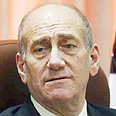
Olmert, Peretz order IDF to act against Qassams
Following emergency security meeting with defense officials Wednesday morning, prime minister, defense minister instruct army to act only against cells launching Qassam rockets into Israel from Gaza
Prime Minister Ehud Olmert and Defense Minister Amir Peretz on Wednesday ordered the IDF to act only against cells launching Qassam rockets into Israel from Gaza.
The decision to break from the current policy of restraint follows an emergency security meeting with military and security officials convened by the PM early Wednesday morning.
It was decided in the meeting that Israel would act against the rocket cells while simultaneously maintaining the ceasefire and acting with the Palestinian Authority in the hopes that they will take action to prevent the rocket attacks emanating from their territory.
"Over the past few days terror groups in Gaza have intensified their rocket attacks against Israeli civilians, this despite the fact that Israel agreed to the ceasefire and has refrained from responding to Palestinian violations of it over the past month," said a statement issued by the PM's office.
The new policy will allow the IDF and Shin Bet to operate from both air and land against cells launching Qassam rockets. State officials say that this will lower the amount of civilian casualties in Sderot and Ashkelon and other communities near Gaza.
Despite the order to act against cells launching Qassam rockets Olmert made it clear that Israel seeks to maintain the ceasefire. The PM has a series of political meetings planned, including, among others, Egyptian President Hosni Mubarak and Egyptian Foreign Affairs Minister Ahmed Aboul Gheit. Olmert is also set to travel to China's capital of Beijing in early January. China is the fifth permanent member of the UN Security Council.
Ali Abu Abdullah, a spokesman for the Islamic Jihad, told Ynet that "Olmert's threats will not prevent us from continuing along the path of resistance and firing the rockets. Any attack on our leaders or leaders of the resistance will be met with a harsh response."
Restraint Collapses
The state's top security echelon reported to Olmert's office on Wednesday for the emergency meeting, including Defense Minister Amir Peretz, Chief of Staff Lt. Gen. Dan Halutz, Shin Bet brass and additional high ranking military and security officials. On the agenda – Israel's restraint over 60 Qassam rockets fired at Israel from Gaza since the ceasefire came into affect on November 6th.
The PM's office said prior to the security meeting that while they view the escalation as grave, there will be an effort to maintain the state's restraint. Israel's restraint in the face of incessant rocket attacks earned the country significant points with the international community. Olmert has also repeatedly stated that he seeks to open a channel of dialog with Palestinian President Mahmoud Abbas while strengthening the latter's standing.
Two teenagers were injured in their legs Tuesday evening by shrapnel of a Qassam rocket fired on Sderot.
One of the youths, Adir Basad, sustained critical wounds and was rushed into surgery. His condition is now stable. The other teen, Matan Cohen, was moderately injured.
Peretz on Tuesday evening briefed Olmert on the Qassam attack in Sderot, saying that "we can no longer hold back against the Qassam fire."
The PM's office warns however that too strong a response may further escalate the situation. In this regard the office quotes Shin Bet chief Yuval Diskin who said on Tuesday that Hamas may be dragged into resuming its violent attacks. Olmert said during Tuesday's cabinet meeting that warring Palestinian factions may try to overcome their infighting by uniting against Israel.
Unilateral restraint
Over the past few days government ministers have spoken out increasingly against the restraint policy. Deputy Prime Minister and Minister of Strategic Affairs Avigdor Lieberman (Israel Our Home) was a particularly outspoken critic of the policy, calling for an organized IDF operation against the rockets with the intention of putting an end to the attacks and not only "placating the public." Other vocal opponents were Internal Security Minister Avi Dichter and Industry, Trade and Labor Minister Eli Yishai (Shas).
Yishai, who is also deputy prime minister, said that "it is impossible to maintain a ceasefire if only one side is observing it… The Palestinians interpreted the policy of restraint as a policy of invitation."
Abu Abdullah, the Islamic Jihad's military wing's spokesman, responded to Israel's decision to attack Qassam launchers by saying that "Olmert's threats to resume targeted killings will not prevent us from continuing in the path of resistance and firing rockets."
Abu Abdullah added that "any harm that comes to any of out leaders or leaders of the resistance will be met with a hard response on our part."
Ali Waked contributed to this report










